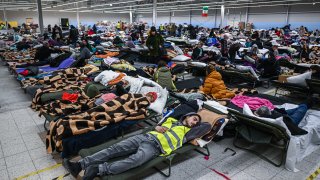
As Russia's war in Ukraine becomes a grim new reality for millions of Ukrainians, the tens of thousands who make the increasingly treacherous journey toward safety each day in the European Union are left with no sense of when, or if, they'll ever return home.
More than 2.8 million people have fled Ukraine in the wake of Russia’s invasion, according to the U.N. refugee agency, the vast majority seeking refuge in Poland, which has taken in more than 1.7 million refugees in the last 19 days.
In the Polish border town of Przemysl, some of those fleeing, mostly women and children, are exhausted and express a simple wish that the war and violence would stop.
“All day crying from the pain of having to part with loved ones, with my husband, my parents,” said Alexandra Beltuygova, 33, who fled from Dnipro, a city between the embattled metropolises of Kyiv and Mariupol.
Get South Florida local news, weather forecasts and entertainment stories to your inbox. Sign up for NBC South Florida newsletters.
“I understand that we may not see them. I wish this war would end,” she said.
Refugees Fleeing from Ukraine
Source: UNHCR
At a refugee center in Suceava in northern Romania, 28-year-old Lesia Ostrovska watched over her 1-year-old son as her daughter, who is 8, played nearby with other children displaced by the war.
U.S. & World
“I left my husband, my father, my mother, my grandparents,” said Ostrovska, who is from Chernivtsi in western Ukraine. “It’s hard with kids, in the bus, here in this situation … We hope that the war is finished soon and we can go back home.”
As the fighting, now in its third week, continues to exact a grievous human toll in Ukraine with Russian troops bombarding many of the country's most populous cities, the number of those crossing into the EU has begun to slowly wane in recent days.
In Hungary, where around 255,000 refugees have entered so far, only 9,000 people crossed the border with Ukraine on Sunday, compared to more than twice that on March 1, according to police.
In Slovakia, where more than 200,000 people have fled, fewer than 9,000 crossed the border on Sunday, down from more than 12,000 four days earlier. In Poland, about 82,000 refugees were admitted, down from an earlier daily peak of around 129,000. Also Sunday, 14,475 Ukrainians entered Romania, down 13% compared to the previous day, border police said.
Gabriela Leu, spokesperson for UNHCR in Romania, said it was difficult to determine what is causing the slowdown in the exodus from Ukraine, but said "I can see the possibility of this being something temporary.”
“The situation is very fragile and very fluid … it’s maybe more difficult for people to move, but it’s just speculation,” Leu said. “But the bottom line is that the numbers continue to grow.”
Even as the pace of those leaving Ukraine has slowed, people fleeing the violence continued to arrive in large numbers in countries on Ukraine's western border.
In Przemysl, some recounted seeing military attacks on civilians, something that Russia continues to deny.
“I saw destroyed houses and fighting. I saw a lot of tanks when I was driving from Kyiv. I know that a house near us was completely destroyed this morning,” said Inessa Armashova, 40, a resident of the Ukrainian capital of Kyiv. “Many people fled. But many cannot leave, sick children or sick elderly people.”
The continued push by Russian forces toward Kyiv comes a day after Russia escalated its offensive by launching airstrikes close to the Polish border, raising fears in the West that the fight was edging closer to the EU and NATO.
Those strikes, which involved waves of deadly Russian missiles hitting a military training base Sunday less than 25 kilometers (15 miles) from Ukraine's border with NATO member Poland, killed at least 35 people. It appeared to be the westernmost target struck during Russia’s invasion of Ukraine.
Residents of the Polish village of Wielkie Oczy, just 2 kilometers (over a mile) from the border, were jolted awake in the middle of the night by the sounds of the blasts.
“My son went out to the balcony. And the neighbors were already awoken and the dogs in the whole village started to bark,” said Franciek Sawicki, 77, who heard the missile attack. “We could see the glow above the forest. It was very noisy and I could hear a loud explosion. And at that moment I knew it was an attack near the border.”
The proximity of the attack to Poland dashed the sense of safety in western Ukraine, which until now had mostly remained free of Russian attacks, and raised the possibility that the NATO alliance could be drawn into the fight.
Ukrainian President Volodymyr Zelenskyy called it a “black day,” and again urged NATO leaders to establish a no-fly zone over the country, a plea that the West has said could escalate the war into a nuclear confrontation with Russia.
But Anjela, 55, a Ukrainian refugee from Poltava who wouldn't give her last name, said after arriving in Poland that only a NATO intervention could end the violence in Ukraine.
“I don’t know when I will see my husband. I don’t know when my children will return home,” she said. “I beg you, it depends only on you! Close the sky, everything else we will do ourselves.”
Click here for complete coverage of the crisis in Ukraine.
___
Justin Spike reported from Budapest, Hungary. Stephen McGrath in Suceava, Romania, Monika Scislowska in Warsaw, Poland, and Karel Janicek in Prague, contributed to this report.



